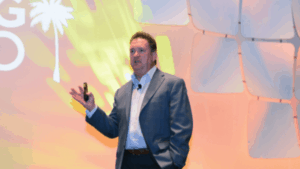
A report on my keynote for the 2016 Benefits Pro conference in Fort Lauderdale earlier this week.
Health care: The Future is Now
BenefitsPro, April 2016
BY SHAWN MOYNIHAN
When listening to futurist Jim Carroll speak, one thing becomes apparent quickly: The future belongs to those who are fast.
Onstage Monday delivering the keynote at the Benefits Selling Expo inside Great Hall 3, Carroll delivered a rapid-fire, deeply insightful “fast future” presentation on where the future of health care and benefits is headed. And to hear him tell it, it is bright for those who would embrace the impact of mobile technology and how the Internet of Things (IOT) will reshape the entire process of health care a lot sooner than later.
For starters, Carroll explained, 10 years from now, health care will look nothing like it does today. A fundamental transformation, he explained, is on its way, and in many cases, already happening. Genetic testing and DNA sequencing will forever alter the manner in which illness is forecasted, diagnosed and treated: in advance of the condition arising rather than after the fact, the way medical professionals do now.
Years ago, he said, having a hand-held device that monitors vital signs, takes your blood pressure, and reads your EKG was the stuff of science fiction. Today, it is a reality, courtesy of the Scanadu Scout (a tool now being tested by more than 7,000 people in more than 70 countries), and that tech will only become less expensive as time goes on. It’s not farfetched, Carroll added, to imagine a day when you can walk into Best Buy and purchase an inexpensive device that does all these things and more, including diagnosing future ailments.
With the advent of technologies that monitor health signs via wearable devices and mobile devices connected to the Internet, only those patients requiring critical care will also change the way hospitals operate — which is advantageous, considering the number of baby boomers who will comprise so much of the U.S. population in the coming decades.
What does all this mean? Massive opportunity, for those who would think forward and recognize how the IoT will shape the world of pharmaceuticals and benefits. The World Economic Forum posits that the global economic impact of the five leading chronic diseases — cancer, diabetes, mental illness, heart disease, and respiratory disease — could reach $47 trillion over the next 20 years.
What if technology could allow medical science to get out in front of that, so that those costs could be slashed?
Carroll said such a world is not as far off as it would seem. Such revolutionary developments in health care virtualization will be driven by big goals and big thinking, said Carroll. Onscreen, he showed the frightening statistics on obesity levels in the U.S. over the past few decades over a map of all 50 states, staggering numbers that illustrate one of the great health challenges of the modern age. However, that’s not even the biggest worry looking forward.
“Alzheimer’s disease and dementia will be the great challenge of our time,” said Carroll, noting that his mother-in-law had suffered and died from the condition (Jim: it was my father in law...), the sixth-leading cause of death in the U.S. Going forward, however, developments in science will allow for earlier detection and better treatment options.
Luckily, medical knowledge, Carroll said, is doubling every eight years. Previously unthinkable advancements such as the 3-D printing of personalized knee replacements are happening now; the growth of replacement organs is something that will be available to medical professionals within years, not decades. Ingestible technology will be able to show us how we’re responding to medications, by offering diagnostics on how our bodies are reacting to treatment.
The greatest challenge faced by health care CEOs, Carroll said, includes the need to focus on a direct relationship with the customer — which will require wholesale re-engineering of member plans — and rapid deployment of mobile products to meet customer expectations. People will become far more engaged with matters of their own health, as they are empowered with technology that’s connected to their mobile device.
Carroll acknowledged what he called the “organizational sclerosis” that hampers big ideas and innovative thinking, but offered this piece of advice for those whose ideas may alter the health care landscape: “Think big, start small, and scale fast.”




GET IN TOUCH
Jim's Facebook page
You'll find Jim's latest videos on Youtube
Mastodon. What's on Jim's mind? Check his feed!
LinkedIn - reach out to Jim for a professional connection!
Flickr! Get inspired! A massive archive of all of Jim's daily inspirational quotes!
Instagram - the home for Jim's motivational mind!